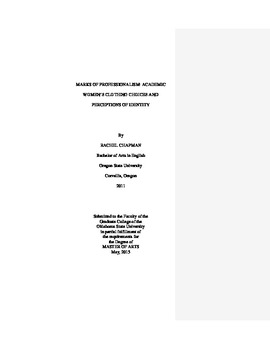| dc.description.abstract | Guidelines surrounding �professional� dress in academic spaces can be implied or obvious, but instead of following a particular formula, these guidelines are viewed as a representation of professional accomplishment, developed and honed throughout a career. However, unlike pedagogical approaches to the composition classroom, professional dress for women is a continually debated idea, following multiple unwritten codes, cultural influences, and generational perspectives. While many points of academic research have centered on ambiguous recommendations about academic women�s dress, none have conducted direct interviews based off of these recommendations. Furthermore, even more research centers on the perceptions of female academic�s identities and how they influence perceptions of validity within academic spaces. In order to understand the gap between these two aspects of research, I explore how these recommendations influence academic women�s perceptions about their scholarly identities. I posit that perceptions about the professional, physical, and behavioral presentation of the female instructor influences perceptions of validity in academic spaces, and these perceptions are rooted in the belief that a woman�s physical presentation contains markers of her identity and capability in academic spaces. Therefore, I suggest a term that identifies this complicated way of seeing: the academic gaze. I suggest that this term can be used to identify the frames through which bodies are monitored, understood, and validated in academic geographies. The academic gaze draws on John Berger�s identification of the assumed male heterosexual audience, the patriarchal organizational structure of academia, and the subordinate positioning of women and female-associated traits within those structures. Considering these perspectives on visual rhetoric, the academic gaze positions women at the intersection of objectification and professionalization, both of which favor masculine definitions of power and seek to remove or deny female agency. Ultimately, my exploration of the ways in which the female body is viewed in academic spaces creates the basis for understanding women�s experiences in academic spaces and the implications of the perceptions of women and their alignment or dissonance with the professional recommendations made by and to female academics for success. | |
